Last month in the “review column” I offered a list of books about the Bible, some relatively recent, true favorites of ours that have proven to be helpful, especially for those who need (and who doesn’t?) a reminder of the central unfolding narrative of the Biblical story. Some see the “acts” of this drama to be creation-fall-redemption-consummation, although we need not use those phrases to learn to live into the Scriptures as the “true story of the whole world” as Leslie Newbigin put it years ago. So do jump back to that list and share the news with others. There are exciting, readable, fun, and helpful resources to help us “get” the vision of Christ’s Kingdom a-coming, as anticipated and foretold, described and explained, in Holy Scripture. I love telling about these aids to Bible understanding, and hope you do to.
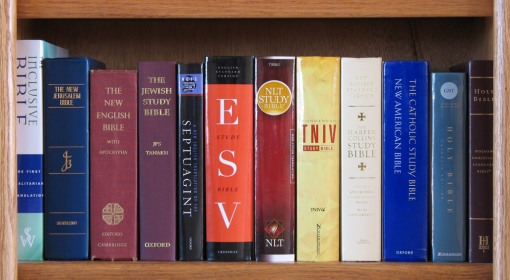
So, we are happy to pick up where we left off. Here are some other basic books that have caught my fancy of late. Most are recent and I thought you should know about them. Keep in mind that this is not a comprehensive list and hardly scratches the surface of the titles we have in the shop. Use our “inquiry” tab to ask us questions or to check prices if you’d like. Or call. We’re always eager to chat, especially about Biblical research.
A Passion for God’s Story: Discovering Your Place in God’s Strategic Plan Phil Greenslade (Paternoster) $19.99 The new cover of this fairly serious British import has a child walking through some artsy photo of what I suppose is a Middle Eastern desert. Weird. The book, though, could have easily been listed with those last month and certainly deserves to be recommended—it explores the overarching strategy of God, explaining the underlying structure of the Bible. It helps us (as it promises on the back) to “recognize the significance of your life by seeing your personal story as part of God’s story.” With endorsements from the likes of Christopher J.H. Wright, Vinoth Ramachandra, and Greg Haslam, you can tell this is starting to wade in the deeper end of the evangelical gene pool. These are very sharp folks (engaged in cutting edge, wholistic ministry) affirming this call to seeing the way in which the Biblical narrative fits together. Slewyn Hughes says “Nothing, I believe, galvanizes the human spirit more than an understanding of the big story that God is writing. Greenslade’s exposition of this theme is one of the finest I have ever read.”
Fixing Abraham: How Taming Our Bible Heroes Blinds Us To The Wild Ways of God Chris Tiegreen (SaltRiver) $14.99 As you may know, younger evangelicals ain’t what they used to be, and this call for a raw and honest study of the weird humanity of our Bible characters is, well, either troubling or refreshing, depending on how you see such things. I’d go with refreshing. This is clever and conversational, a bit sarcastic, and a good critique of how we, well, uh, wouldn’t really want the kinds of people who populate the Bible in our parish or ministry team. Isaiah going naked for three years? Paul turning everybody of? Ruth throwing herself at some guy’s feet in the middle of the night? What a hoot this is, imagining how we might grapple with the real people of the real text. Good for him. Who said Bible study has to be boring or safe?
Genesis from Scratch: The Old Testament for Beginners Donald L. Griggs & W. Eugene March (W/JK) $12.95 Perhaps you know Grigg’s popular volumes The Bible From Scratch: Old Testament for Beginners and The Bible From Scratch: The New Testament for Beginners. This is modeled after those popular paperbacks, written by a legendary educator know in mainline denominatikonal circles, especially. With endorsements from the likes of Princeton Bible scholar and educator (respectively), Patrick Miller and Freda Gardner, this is obviously the sort of thing that is solid, useful, and fully suited for teachers wanting to study, or lead a study. Griggs, by the way, has expert help, here, from Eugene March from Louisville Presbyterian Theological Seminary. Half the book is a 7-session participants study, half is a leaders guide.
Mark’s Gospel From Scratch: The New Testament for Beginners Donald L. Griggs & Charles D. Myers, Jr. (W/JK) $12.95 Again, as I said above, you should know Grigg’s popular volumes The Bible From Scratch volumes on Old & New Testament which have been popular in mainline circles for years. This new series is
modeled after those popular paperbacks, written by the legendary Griggs. The Genesis one (above) is the first in the new series, and now this—on Mark. Yay. I am very, very excited about this as Grigg’s co-author is one of my own favorite Bible teachers, C. “Buzz” Myers, a Presbyterian minister who teaches in the religion department at Gettysburg College. And man, does he teach well. He’s very well loved by folks who have heard him and he has been generous in speaking and teaching throughout our South Central PA region. Buzz was involved as a recording secretary noting all the changes being made for the evolving NRSV years ago, so he is very aware of Greek details and textual nuances. Half the book
is a six-week participants study, half is a leaders guide.
Genesis for Everyone part one and part two John Goldingay (W/JK) $14.95 each You may know how we recommend the “everyone” series of New Testament commentaries by N.T. Wright. About the same handy size as the old Barclay series, or the Tyndale ones, they are perfect for quick reading, helpful insight about both the immediate text and the way it is placed in the broader story. There was some debate about who might do a similar Old Testament “for everyone” series that would be winsome, brief, informed, and helpful. Thank God that W/JK chose a wonderful Bible guy, the prolific, insightful, and well-read Brit, J.G. These are going to be released pretty quickly—he’s quite the faithful author and is the man for the job. Start collecting your series now, and make sure your church librarian knows about them for those needing this level of reliable, interesting work.
 From Stones to Living Word: Letting the Bible Live Again Debbie Blue (Brazos) $16.99 Blue is the Minnesota pastor of one of these really unusual, edgy, faith communities that may be called emergent (although I don’t know if they call themselves that, but with a name like House of Mercy, who knows what they’re called.) She wrote a few years ago a spectacular collection of essays called Sensual Orthodoxy that was published at an indie publishing venture, so perhaps wasn’t as well known as it should have been.(We have it, though!) She sounds a bit like Anne Lamott when you hear her—maybe a bit more intense—and she is a good, if quirky, preacher. This collection of
From Stones to Living Word: Letting the Bible Live Again Debbie Blue (Brazos) $16.99 Blue is the Minnesota pastor of one of these really unusual, edgy, faith communities that may be called emergent (although I don’t know if they call themselves that, but with a name like House of Mercy, who knows what they’re called.) She wrote a few years ago a spectacular collection of essays called Sensual Orthodoxy that was published at an indie publishing venture, so perhaps wasn’t as well known as it should have been.(We have it, though!) She sounds a bit like Anne Lamott when you hear her—maybe a bit more intense—and she is a good, if quirky, preacher. This collection of  sermons/essays seems at first to be about how to get the Scriptures to “live again” in our post-modern midst, but her strategy is age-old. She tells the darn stories in all their bloody complexity and lets it go at that. Sally Morgenthaler writes of it, this: “Debbie Blue’s soulful reconstitution of the Christ narrative is nothing short of divine alchemy. Absolutely brilliant.” If you want renewed wonder, new, robust curiosity about these Godly/human texts, this will help you come to new appreciation (which seems a tame word) of the Bible. Mark Scandrette says she is “smart and earthy.” Oh yeah. And, I think, faithful–creatively so– to the texts.
sermons/essays seems at first to be about how to get the Scriptures to “live again” in our post-modern midst, but her strategy is age-old. She tells the darn stories in all their bloody complexity and lets it go at that. Sally Morgenthaler writes of it, this: “Debbie Blue’s soulful reconstitution of the Christ narrative is nothing short of divine alchemy. Absolutely brilliant.” If you want renewed wonder, new, robust curiosity about these Godly/human texts, this will help you come to new appreciation (which seems a tame word) of the Bible. Mark Scandrette says she is “smart and earthy.” Oh yeah. And, I think, faithful–creatively so– to the texts.
God as Author: A Biblical Approach to Narrative Gene C. Fant, Jr. (B&H Publishing) $19.99 Well, we talk about how the Bible is a grand Story, and these days even theology is construed narratively. As you might guess, I think this is mostly a good thing. Professor Fant is a teacher of English and this provocative book could be put with literary studies as easily as Biblical studies. Essentially, he says that the Christian gospel permeates all other stories, the stories of our lives under God’s sun, even as he insists this is because of God’s self-revelation (as disclosed in the Bible.) As Michael Travers (Professor of English at Southeastern Baptist) says, “This is an important book—accessible and thought provoking.”
Worldview guru and mystery novelist J. Mark Betrand writes, “If you want to know what our knowledge of a story reveals about God and what our knowledge of God tells us about story, God as Author is the place to start. Keenly focused yet wonderfully digressive, Gene Fant’s book will be an invaluable companion for artists and theologians alike.” James Sire says there are “beautifully written gems on every page.” This kind of stuff is rare, and I applaud Broadman for releasing it. I think it will help you be a better reader, more appreciative of good books, attuned to living your own story, and, happily, will help you understand your Bible better.
 Free for All: Rediscovering the Bible in Community Tim Conder & Daniel Rhodes (Baker) $16.99 This is one of the books in the emersion line that are billed as “Emergent Village resources for communities of faith.” It is a spectacular book, rich, thoughtful, demanding, messy, and maybe one of the most important ones they have done. This is not yet another call for hipster and inclusive churches or ancient-future liturgies, but a serious and radical invitation to be communities of discourse gathered around the complex and life-giving Holy Bible. Community, Bible-reading. A free-for-all? Holy-moley, this could get crazy, couldn’t it, if we have utter commitments to one another and profound submission to the authority of the living Word, but are invited to be honest about our disagreements and struggles living in to and out of this strange new world of the Bible. This, though, isn’t about brawling. Here are a few important voices who can describe it better than I can:
Free for All: Rediscovering the Bible in Community Tim Conder & Daniel Rhodes (Baker) $16.99 This is one of the books in the emersion line that are billed as “Emergent Village resources for communities of faith.” It is a spectacular book, rich, thoughtful, demanding, messy, and maybe one of the most important ones they have done. This is not yet another call for hipster and inclusive churches or ancient-future liturgies, but a serious and radical invitation to be communities of discourse gathered around the complex and life-giving Holy Bible. Community, Bible-reading. A free-for-all? Holy-moley, this could get crazy, couldn’t it, if we have utter commitments to one another and profound submission to the authority of the living Word, but are invited to be honest about our disagreements and struggles living in to and out of this strange new world of the Bible. This, though, isn’t about brawling. Here are a few important voices who can describe it better than I can:
This is as clear and thought provoking a statement as I have seen yet of a theology of Scripture for emergence Christianity. Phyllis Tickle
A wonderful exercise in biblical hermeneutics…Weaving in popular culture, well-informed Christian theological insights, and excitement for the Bible as uniquely revelatory, Condor and Rhodes lead us into a fresh new encounter with Scripture. Will Willimon
And this, from a person whose radical insights about the Bible I trust deeply, and who is living it out it vibrant and admirable ways, Brian Walsh (co-author of Colossians Remixed and those moving fictionalized Biblical narratives in Beyond Homelessness)
There is, in this book, good news for those of us who are passionate about Scripture, deeply committed to community, and longing to experience the power of both with candor and openness in the midst of our pain, confusions, and disappointments.
40 Questions About Interpreting the Bible Robert Plummer
& Benjamin L. Merkle (Kregel) $17.99 It seems to me that many of
those who are regular church-goers and even active in a Bible study may
never have really studied just how to read the Bible well. They just do
it (or, more likely, don’t.) This is an excellent, honest primer on how
to interpret the Bible faithfully, offering fine and fair answers to
very, very important questions. These questions move beyond the obvious
pointers towards a lively and faithfully conservative hermeneutic. It
is quite clear and truly interesting. The authors happen to be Southern
Baptist, but their strongest blurb on the back is from Kevin Vanhoozer,
one of the best names in this biz (from Wheaton College.) I enjoyed it a
lot—very nicely done.
Gospel-Centered Hermeneutics: Foundations and Principles of Evangelical Biblical Interpretation Graeme Goldsworthy (IVP) $29.00 Okay, we are getting more academic, here, but this splendid Bible scholar from Australia is a gentleman all should know. Three older books about the Bible and the Kingdom of God are available in one paperback, affectionately known as the “Goldsworthy triology.” He has done stuff on IVP, on Eerdmans, on Paternoster. This recent hardback has gotten rave, rave, reviews from the likes of Tremper Longman, Asbury’s Joel Green, Kevin Vanhoozer. “Erudite and seasoned reflections” one scholar called these and even though they are about hermeneutical practice, there is lovely pastoral concern for the people of God as we read, interpret, and seek to live by God’s Word written.
Bible Babel: Making Sense of the Most Talked About Books of All Time Kristin Swenson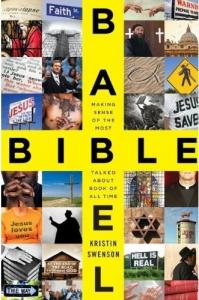 (HarperOne) $24.99 I hesitate listing this next to brilliant and reliable scholars like Goldsworthy, or faithful and honest strugglers like Condor or Blue. Yet, here goes: it is a readable introduction to the Bible for those who are perhaps not familiar with its views or are unaware of these theological quandaries. Robert Alter says it is a “breath of fresh air” and Stephen Prothero calls it “a book on the Bible for the rest of us.” Well, I think the ones listed above are “for the rest of us” but you get what he means, believers or otherwise. This is a call to Biblical literacy, aware of how the Bible shows up in popular culture (like that scene of raining frogs that perplexed fans of Magnolia or those ubiquitous fish symbols.) Funny and feisty, informed by critical scholarship, this is an interesting intro for skeptics or seekers who need an honest, liberal take on “the biggest story ever sold.”
(HarperOne) $24.99 I hesitate listing this next to brilliant and reliable scholars like Goldsworthy, or faithful and honest strugglers like Condor or Blue. Yet, here goes: it is a readable introduction to the Bible for those who are perhaps not familiar with its views or are unaware of these theological quandaries. Robert Alter says it is a “breath of fresh air” and Stephen Prothero calls it “a book on the Bible for the rest of us.” Well, I think the ones listed above are “for the rest of us” but you get what he means, believers or otherwise. This is a call to Biblical literacy, aware of how the Bible shows up in popular culture (like that scene of raining frogs that perplexed fans of Magnolia or those ubiquitous fish symbols.) Funny and feisty, informed by critical scholarship, this is an interesting intro for skeptics or seekers who need an honest, liberal take on “the biggest story ever sold.”
Making Sense of Bible Difficulties: Clear and Concise Answers from Genesis to Revelation Norman Geisler & Thomas Howe (Baker) $13.99 Those who are exposed to undergrad introductions of the Bible, often
taught by unbelieving profs who are parroting out-dated critical
scholarship from a generation or more ago, sometimes start falling for
the credibility of the case against Scripture. This is the sort of book
they should read before they dismiss the historic case for the
reliability of Scripture. There are bigger and better books, I suppose,
but for my hard-earned cash, this is one solid resource that would
assure anyone that there can be great confidence in the orthodox view and that there are intellectually plausible ways to resolve some of the evident oddities of Scripture. This is written in a “problem/solution” format, offering dozens of questions or problems—this text contradicts that one, this manuscript seems flawed, these dates seem out of sync, etc., etc. This is an abridged and revised version of an older title, The Big Book of Bible Difficulties.
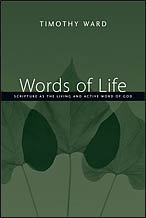 Words of Life: Scripture as the Living and Active Word of God Timothy Ward (IVP) $22.00 I’ve mentioned Kevin Vanhoozer. I was truly struck by his remarks, “I have been on the lookout for a compelling and contemporary treatment of the nature and authority of Scripture for years. I ask of every promising new title, ‘Are you the one who is to come, or shall I look for another?’ Ward’s book may be the one. Words of Life rightly roots its thinking about Scripture in the doctrine of God, and that means trinitarian theology. His central insight: God’s word is something that God does…highly recommended.” This is meaty stuff by a Team Vicar in England and has published an even meatier volume on Oxford. Sterling reviews by the likes of Donald Macleod (Free Church of Scotland), J.I. Packer and Paul Helm (both from Regent) and Julia Harrdyman from Eden Baptist in Cambridge. Heavy stuff, judicious, and shaped itself by the Scriptures themselves.
Words of Life: Scripture as the Living and Active Word of God Timothy Ward (IVP) $22.00 I’ve mentioned Kevin Vanhoozer. I was truly struck by his remarks, “I have been on the lookout for a compelling and contemporary treatment of the nature and authority of Scripture for years. I ask of every promising new title, ‘Are you the one who is to come, or shall I look for another?’ Ward’s book may be the one. Words of Life rightly roots its thinking about Scripture in the doctrine of God, and that means trinitarian theology. His central insight: God’s word is something that God does…highly recommended.” This is meaty stuff by a Team Vicar in England and has published an even meatier volume on Oxford. Sterling reviews by the likes of Donald Macleod (Free Church of Scotland), J.I. Packer and Paul Helm (both from Regent) and Julia Harrdyman from Eden Baptist in Cambridge. Heavy stuff, judicious, and shaped itself by the Scriptures themselves.
Collected Writings on Scripture D.A. Carson (Crossway) $27.99 I have taken issue 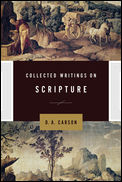 withsome of Dr. Carson’s blunt dismissal of postmodern thinking and what I considered to be rather unkind polemics at times. I suppose that is his style, and suppose he is just a fairly straight-forward writer. Some might suggest that his writing isn’t, uh, warm (but then again, most serious scholarship isn’t.) Yet, he is one of the important Biblical scholars of our time, and his many books have found to be very, very helpful for many a young evangelical scholar. He is a serious and weighty academic, and it is a great gift to have such a very handsome collection of some of his miscellaneous pieces on the authority and interpretation of Scripture. I’ve long wanted to read some of these journal articles, essays, and book reviews, and am thrilled to promote this important volume which brings together these pieces in one place. The usual serious suspects grace the back dust jacket—Michael Horton, Ligon Duncan, John Woodbridge. Westminster Seminary’s Academic Dean, Carl Trueman sums it up well,
withsome of Dr. Carson’s blunt dismissal of postmodern thinking and what I considered to be rather unkind polemics at times. I suppose that is his style, and suppose he is just a fairly straight-forward writer. Some might suggest that his writing isn’t, uh, warm (but then again, most serious scholarship isn’t.) Yet, he is one of the important Biblical scholars of our time, and his many books have found to be very, very helpful for many a young evangelical scholar. He is a serious and weighty academic, and it is a great gift to have such a very handsome collection of some of his miscellaneous pieces on the authority and interpretation of Scripture. I’ve long wanted to read some of these journal articles, essays, and book reviews, and am thrilled to promote this important volume which brings together these pieces in one place. The usual serious suspects grace the back dust jacket—Michael Horton, Ligon Duncan, John Woodbridge. Westminster Seminary’s Academic Dean, Carl Trueman sums it up well,
Scholarly, reverent, carefully argued, and generously footnoted, these pieces all make important contributions to current debates; and taken as a whole, they admirably expose the problems of the revisionism offered by certain voices within the church while pointing readers to a better way.
The day this came I turned to his thorough, critical engagement with Pete Enns important book Inspiration and Incarnation which helped give important insight to why he was so maligned in some circles. And, I read with great interest his fine critique of N.T. Wright’s little book The Last Word. This is high caliber stuff and it is highly recommended. If you know conservative evangelical scholarship, you know the caliber of his work. If you are still reading this, but don’t find yourself familiar with this intellectual tradition, I’d invite you to check it out as an example of the level of discourse happening in places like Trinity, Deerfield, where Carson works. His PhD, by the way, is from Cambridge, and he has authored over 50 books and is a recent co-founder of the “Gospel Coalition.”
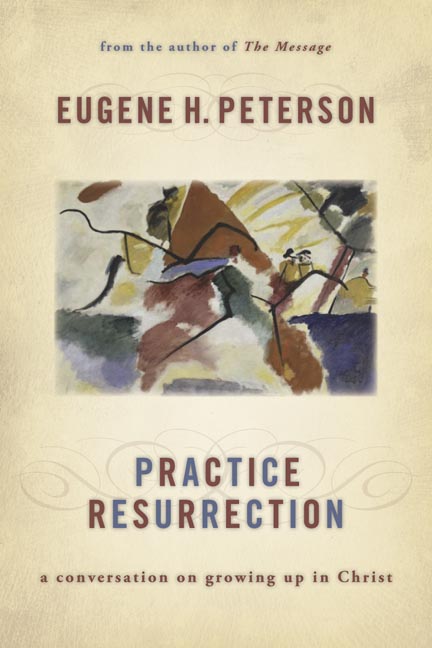 Practice Resurrection: A Conversation on Growing Up in Christ Eugene Peterson (Eerdmans) $24.00 Did I save the best for last? Perhaps so. After all our evaluations of what the Bible is, how it comes to us and how it works, after our reflections on its grand flow and overall point, of how to read it and make sense of it and how to struggle with it, finally—yes—it comes down to reading it. And one of our finest, pastoral, warm and thoughtful guides to careful reading is Eugene Peterson. This is the fifth in his majestic series of “conversations” on spiritual theology. It is a study of Ephesians. I think my favorite may still be the very first (Christ Plays in Ten Thousand Places) but it is not uncommon for other customers and friends to each have their own favorite; Eat This Book is precisely on how to read slowly and meditatively, so should be mentioned here. Not a one has been poorly received and anybody who is interested in contemporary pastoral theology will own Peterson’s books. Enough said.
Practice Resurrection: A Conversation on Growing Up in Christ Eugene Peterson (Eerdmans) $24.00 Did I save the best for last? Perhaps so. After all our evaluations of what the Bible is, how it comes to us and how it works, after our reflections on its grand flow and overall point, of how to read it and make sense of it and how to struggle with it, finally—yes—it comes down to reading it. And one of our finest, pastoral, warm and thoughtful guides to careful reading is Eugene Peterson. This is the fifth in his majestic series of “conversations” on spiritual theology. It is a study of Ephesians. I think my favorite may still be the very first (Christ Plays in Ten Thousand Places) but it is not uncommon for other customers and friends to each have their own favorite; Eat This Book is precisely on how to read slowly and meditatively, so should be mentioned here. Not a one has been poorly received and anybody who is interested in contemporary pastoral theology will own Peterson’s books. Enough said.
